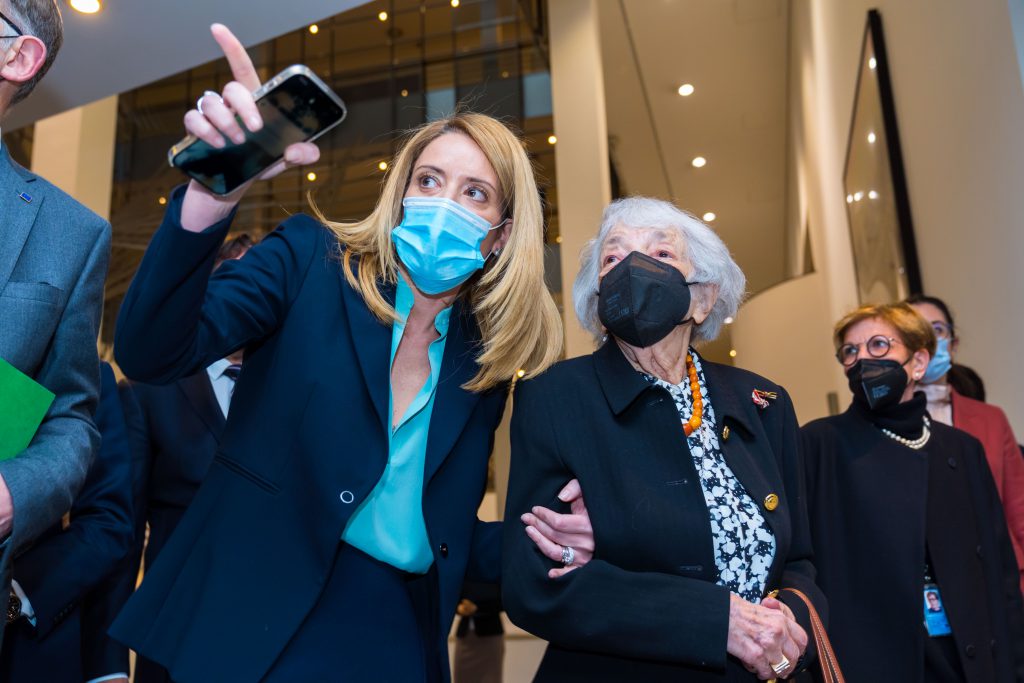“Never again”: EP commemorates International Holocaust Remembrance Day

77 years after the liberation of the Auschwitz Nazi concentration camp on 27 January 1945, MEPs honoured the memory of victims of the Holocaust.
Opening the ceremony, EP President Roberta Metsola said: “On Holocaust Remembrance day, we remember crimes committed against humanity in the past, but we also remember the importance of speaking up, in the present. United in diversity, we speak up against Holocaust deniers, against conspiracy myths, against disinformation and against violence of every kind that target and single out members of our communities”.
“We will honour the legacy of the Holocaust victims. By never forgetting. By never being complacent. By always, always speaking up.”
In her speech, 100-year=old Holocaust survivor Margot Friedländer spoke about how her mother and brother were killed in Auschwitz, and how she herself was caught and deported to the concentration camp of Theresienstadt, where she witnessed indescribable suffering but survived.
Mrs Friedländer explained how, after moving back to Berlin from New York at the age of 88, she now travels around Germany to meet pupils, whom she asks to become witnesses to the horrors of the Holocaust as she and her fellow survivors will not be able to for much longer. “Be human! People did what they did because they did not recognise people as people,” she said. “You cannot love all people, but everyone deserves to be respected. There is no Christian blood, no Jewish blood, no Muslim blood, there is only human blood. We are all the same. What happened, happened – we can no longer change it. It must only never, ever happen again.”
She warned that today the memory of the Holocaust is “politically abused, sometimes even ridiculed and trampled on”. The so-called “Jewish Star”, she said, is “shamelessly used today by new enemies of democracy to style themselves in public – and in the middle of a democracy! – as victims. On a day like today, we must stand together so that the memory of the Holocaust remains true and is not abused by anyone.”
Mrs Friedländer concluded her speech by calling on people to be “vigilant, and not look away as we did then. Hatred, racism, anti-Semitism must not be the last word in history. Treating people as human beings, regardless of skin colour, religion or ethnicity, is especially true today. Humanity, tolerance and respect are more important than ever for peaceful coexistence. That is my wish on this important day of remembrance and commemoration, for the world, for Europe, and for us all.”
European Council President Charles Michel stressed that the Holocaust was a European tragedy, and that unimaginable crimes were perpetrated on European soil. “We all have a special responsibility and a special duty. And we are all the guardians of this memory,” he said, highlighting that Europe is the home of Jews and that defending European democracy means fighting antisemitism.
In her response to Mrs Friedländer’s testimony, European Commission President Ursula von der Leyen said: “The Union we want to build is a place where everyone can be who they want to be. A place where a Jewish woman like Simone Veil, a survivor of the Holocaust, can rise to become the President of this proud European Parliament, a place where everyone is entitled to the same rights, and is treated with the same dignity.” The commemoration concluded with a minute’s silence in honour of the victims of the Holocaust, and a musical interlude.
